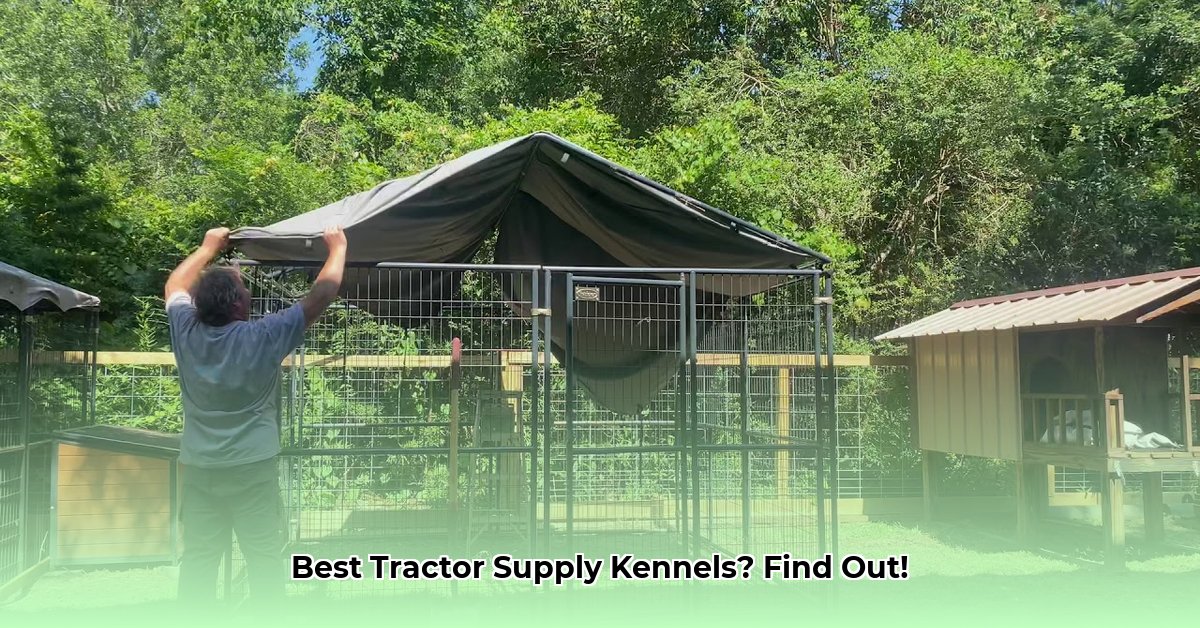
Choosing the right kennel for your dog is a significant decision. This comprehensive guide will help you navigate the options available at Tractor Supply, ensuring your canine companion has a safe, comfortable, and environmentally responsible haven. For even more options, check out these Tractor Supply dog kennels.
Kennels Tractor Supply: A Comprehensive Buying Guide
Tractor Supply offers a variety of kennels, catering to different dog breeds, sizes, and owner preferences. This guide will help you find the perfect fit, considering size, materials, features, and even sustainability.
Determining the Ideal Kennel Size: A Measurement Guide
Before you begin shopping, measure your dog's length, height, and width. The kennel should allow your dog to stand, turn around comfortably, and lie down stretched out. A kennel that's too small causes stress and anxiety, while one that's too large can become unsanitary. Tractor Supply offers a range of sizes to accommodate various breeds.
Kennel Materials: Durability and Environmental Considerations
Tractor Supply typically stocks metal and plastic kennels. Metal kennels are durable and easy to clean but can become excessively hot or cold depending on the weather. Plastic kennels are generally lighter and cheaper, but may not withstand a determined chewer. Consider your dog's chewing habits and your climate when making your decision. For example, in areas with extreme temperature fluctuations, a well-insulated plastic kennel might be preferable.
Essential Kennel Features for Enhanced Canine Comfort
Beyond size and material, consider additional features:
- Easy-to-clean floors: Simplify cleaning and maintenance.
- Ventilation: Ensure proper air circulation to prevent overheating or suffocation.
- Wheels: Facilitate easy mobility if needed.
- Sturdy construction: Especially important for energetic or clumsy dogs.
These features significantly impact your dog's comfort and the ease of kennel maintenance.
Wire vs. Solid Kennels: A Comparative Analysis
The choice between wire and solid kennels depends on your dog’s personality and your environment:
| Feature | Wire Kennel | Solid Kennel |
|---|---|---|
| Pros | Excellent ventilation; easy to clean; lightweight; often more affordable | Durable; provides more privacy; offers better insulation; usually more secure against chewers; |
| Cons | Less privacy; can be cold in winter; potential for injury (especially for small breeds); not ideal for escape artists | Less ventilation; cleaning can be somewhat tricky; might get warmer in hot weather |
Consider your specific needs and your dog's characteristics when deciding.
Setting Up Your New Kennel: Creating a Safe and Welcoming Space
Proper setup is crucial for a positive kennel experience.
- Location: Choose a well-ventilated, draft-free area away from direct sunlight.
- Bedding: Provide soft, absorbent bedding that's safe for your dog to avoid ingestion.
- Positive Reinforcement: Introduce the kennel gradually using positive reinforcement, treats, and praise. Never use it as punishment.
This creates a positive association with the kennel, making it a safe and comforting space.
Maintaining Your Kennel: Cleaning and Long-Term Care
Regular cleaning using pet-safe products is essential. Inspect the kennel regularly for any damage, addressing it promptly to ensure safety.
Sustainable Kennel Choices: Minimizing Your Environmental Paw-print
Choosing a sustainable kennel reduces your impact on the environment.
- Eco-Friendly Materials: Consider kennels made from recycled or sustainably sourced materials like reclaimed wood or bamboo.
- Energy Efficiency: Opt for well-insulated kennels to reduce reliance on energy-intensive heating or cooling.
- Water Conservation: Choose designs that are easy to clean, minimizing water consumption.
- Waste Management: Implement responsible waste disposal and composting practices.
By selecting a durable kennel made from recycled materials, and by practicing responsible cleaning and waste management, you can minimize your environmental impact.
Three Pivotal Points for Sustainable Kennel Ownership:
- Material selection: Prioritize recycled or sustainably harvested materials for reduced environmental impact.
- Energy efficiency: Well-insulated kennels reduce reliance on energy-intensive climate control.
- Waste management: Implement a responsible plan for waste disposal and composting to minimize your carbon paw-print.
Remember, responsible kennel ownership isn't just about providing a safe and comfortable space for your dog; it's also about minimizing your environmental footprint. By making informed decisions and implementing sustainable practices, you can create a haven for your canine companion while contributing to a healthier planet.